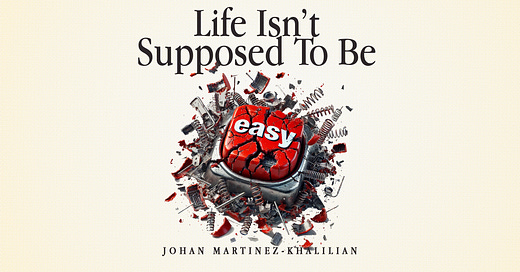If You’re Easily Offended, Stop Reading Now
Life isn’t supposed to be easy. But lately, I can’t help noticing how often people complain about things being “hard.”
Let’s get this out of the way: life isn’t supposed to be easy. But lately, I can’t help noticing how often people complain about things being “hard.”
My job is hard.
Owning a business is hard.
Having a boss is hard.
Marriage is hard.
Divorce is hard.
Being single is hard.
Paying taxes is hard.
Setting boundaries is hard.
But what if the problem isn’t how hard these things are? What if the real issue is that they’re exposing something uncomfortable about ourselves—our weaknesses?
Think about it: if you try to bench press 150 pounds without ever touching a weight in your life, it’s going to feel impossible. But for someone who consistently trains, 150 pounds might as well be a warm-up set. It’s not the weight that’s the problem. It’s your preparation—or lack thereof.
The same applies to life. The things you call “hard” aren’t inherently difficult. They’re simply revealing areas where you lack strength, skill, or experience.
Take leadership, for example. Leading a team is only “hard” if you haven’t developed the skills to do it well. But if you’ve mastered communication, delegation, time management, and the ability to inspire others, leadership feels natural. It’s like muscle memory—you don’t overthink it; you execute.
I work with elite athletes who make the impossible look effortless. Think of Simone Biles defying gravity or Lionel Messi weaving through defenders as if they were traffic cones. These athletes face challenges most of us couldn’t fathom, but they thrive because they’ve cultivated the focus, resilience, and discipline to meet those challenges head-on. Their excellence isn’t accidental—it’s earned.
Now, let’s be clear: identifying your weaknesses isn’t comfortable. It’s much easier to label something as “hard” and move on. But that mindset is a trap. It keeps you stuck, powerless to grow or change. On the other hand, facing your weaknesses head-on—acknowledging where you’re struggling and doing the work to improve—is what separates the average from the extraordinary.
As a mental performance coach, I tell my clients, “Hard isn’t bad. Hard is feedback.” When you struggle, it’s not the universe conspiring against you—it’s an opportunity to evolve. The question is, will you embrace it or resist it?
Take a moment to reflect on what you call “hard” in your life. Are they truly insurmountable, or are they just revealing areas you need to level up? If you approach these challenges with the same intentionality as an athlete perfecting their craft, you’ll discover they aren’t as daunting as you thought.
Owning a business? That’s your bench press. Marriage? Your marathon. Boundaries? Your sparring session. With the right mindset and preparation, these challenges stop being obstacles and become opportunities to showcase your strengths.
So, the next time you’re tempted to complain about something being hard, pause. Ask yourself: Is it really hard or just exposing where I need to grow? The choice to rise or retreat is yours.
And trust me, the weight only feels lighter when you get stronger.




